There are life-changing options now available for denture wearers. St. Lawrence Dentistry has solutions for regaining the type of mouth function we are born with and is pleased to offer them to the Mississauga Community.
Patients worry about the emotional effects of tooth loss. Evidence from the “New England Elder” dental survey suggests that many elders have inadequate dentures that cannot meet their basic needs of function, phonetics, and aesthetics. In 2004, Dr. Geine reported that the completely edentulous (toothless) patient meets the WHO definition of being handicapped since these patients avoid eating in others company due to difficulty chewing. The McGill consensus (2004) stated the first choice in the standard of care for treating someone with a toothless lower jaw using is an overdenture retained by two dental implants.

As patients lose teeth, they experience facial collapse and jawbone changes. Problems in the ability to chew and nutritional deficiencies begin to emerge. When we meet patients missing teeth, we can assess their mouth “functional capacity” they are currently at and give them a realistic expectation about what is possible. When you have all your natural teeth, you are, in theory, at 100% functional capacity. If you have no teeth or dentures, we classify this as close to zero. A lower denture, in it of itself, will only restore 10% of functional capacity. Upper dentures fair better, and we can usually make one that will satisfy a patient’s needs. A lower denture has many factors working against us, such as the tongue, mobile tissue, and lack of retention due to bone resorption.
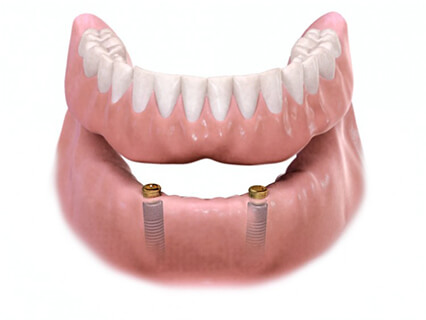
Implants can provide support and retention to dentures. An implant over-denture is where a denture attaches to the implants. In general, it can restore about 60% of the functional capacity to a person’s mouth. An implant bridge is when crowns are fastened directly to implants, and no denture is needed. Implant bridges can restore 90% of a person’s functional capacity. We cannot always restore all your original chewing ability, but we can come close with these modern dental appliances.
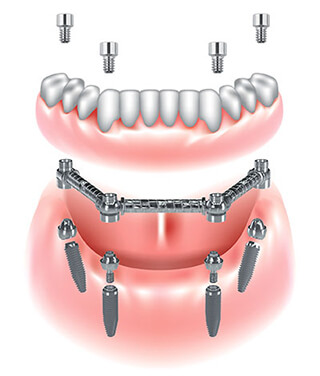
There are many benefits of dental implants for patients who do not have teeth. They increase dentures retention, maintain your jaw “cortical bone”, and slow/slop the jawbone’s shrinking. Patients find implants significantly improve their ability to chew food, leading to a higher quality of life.
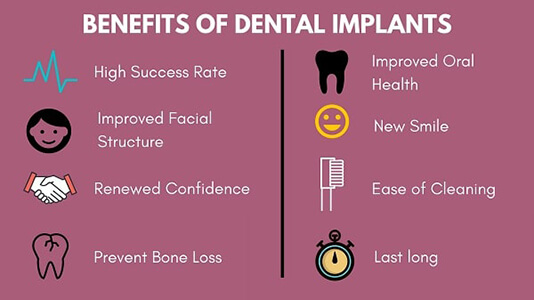
St. Lawrence Dentistry offers “overdenture” treatment on 2 or 3 implants or a “fixed” denture on 4-6 implants for the lower teeth. We consider if the patient is ok with removing their teeth at night and the status of the opposing dentition. We usually put two implants in the lateral incisor or canine region for a two-implant lower overdenture. Placement of implants too far back in your mouth acts as a “sea-saw”, and the denture can rock. A maxillary implant overdenture needs more support, preferably 4-6 implants splinted with a bar, to reach similar results as a two-implant option in the mandible. It is our job, as your Mississauga Dentist, to convey what an overdenture can achieve and what a fixed reconstruction can achieve
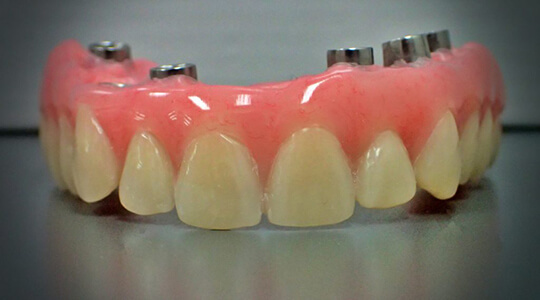
There are some contraindications of dental implants for patients missing their teeth. If the patient’s manual dexterity is such that they cannot remove an appliance, a removable appliance does not make sense. Compromised medical history can increase the risk of adverse effects when placing implants. Patients with diabetes are more prone to infection and have a slower healing process. However, implants have a high success rate when implants, when placed in diabetic patients whose diabetes is under control. Smoking does not rule implant placement outright, but it does raise some red flags. Smoking causes a 50% reduction in oxygen to the bone. There is a greater risk of developing peri-implantitis (loss of bone around implants) due to increased resorption of the peri-implant bone.
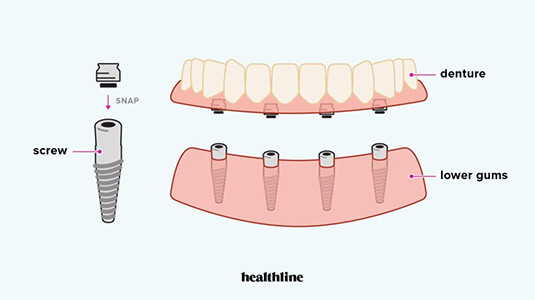
When patients come into our office, we listen and discuss your goals and concerns. We review your medical and dental history and complete a clinical exam. Of note, we check if a patient is on blood thinners such as Xarelto, Pradaxa, or Eliquis. These are essential medications for Dr. Hawryluk Jr. to be aware of as no predictable reversing agent is available for, and they have about a 12-hour half-life. Bisphosphonates are another medication class we look out for when planning implants. They irreversibly alter the osteoclasts (bone dissolving cells), so little or no bone resorption is possible – this affects the bone’s ability to heal.

When designing an implant-retained overdenture for you, space analysis is critical- this is how much space we have between your upper and lower jaws to put your new teeth. We consider biomechanics with regards to where and how many implants we place for you. We will ask you if your current denture is causing you any pain or if it feels loose. Severe resorption of the lower jaw can a jaw nerve area called the ‘mental foramen’ be less insulated. Typically, the only way to relieve that pain will be implants not connected to a denture (fixed solution). If your chief concern relates to denture looseness, then an implant over-denture could be right for you. Both a two-implant overdenture and a multi implant fixed prosthesis provide a similar patient satisfaction improvement. However, a two implant-retained overture is always going to have some posterior rock, whereas a fixed reconstruction will be solid and stable. In terms of stability, retention, and ease of chewing, a fixed dental prosthetic is rated higher by patients. A fixed bar is an ideal type of implant-supported and retained prosthetic, which can relieve pain. An overdenture differs in that it is implant-retained but “tissue supported”. All the overdentures use a similar “ball-type attachment”, which uses a “fishtail motion” to click on and off.

Please call St. Lawrence Dentistry if you would like to investigate if implants are right for you. Our Mississauga dental clinic has lots of free parking and is open Saturdays.
Reference: Viva Learning – Hallas (2020) solutions for achieving success in the edentulous mandible
- St. Lawrence Dentistry Looks Forward To St. Patrick’s Day! - March 12, 2025
- Understanding Dental X-Rays and Radiation: What You Should Know - January 13, 2025
- Happy New Year from St. Lawrence Dentistry! - December 30, 2024










